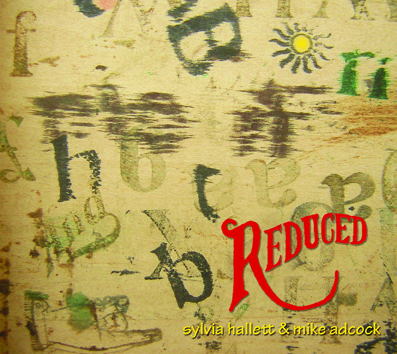Sylvia Hallett – violin, saw, bicycle wheel, lentils, FX pedals, voice
Mike Adcock – accordion, guitar, autoharp, marble chute, percussion
“The Spontaneous Music Ensemble lineup of drummer/cornetist John Stevens and soprano saxophonist Trevor Watts can, for countless reasons, serve as the template against which many another freely improvising duo can be gauged. That’s an especially pertinent point with Reduced, as multi-instrumentalists Sylvia Hallett and Mike Adcock have fashioned a dialog every bit as rarefied as the one that Stevens and Watts created. Not even the highly residual influence of late period John Coltrane—that was, by a stretch of the imagination, detectable in that ensemble’s work—comes through here. The results are extraordinary.
The presence of the accordion underlines that point, in no small part. The cryptically titled “Strange Power! I trust they might” finds the instrument rearing out of a swell of noise—not so much white as mid-grey—simultaneously soothing yet shot through with palpable unease. If this was music of the sea, then the water would be teeming with marine life beyond imagining.
“Notched like harps” is music for a story yet to be written, but this duo’s imagination is such that they’ll probably write it sooner or later. Adcock’s guitar playing has a kind of folksy edge, which inspires thoughts of country folk enthralled to age-old customs, the like of which have no longer have a place in the “civilized” world, while Hallett conjures approximations of whale songs from her violin.
“Try turning it upside down” might well be very practical advice, but in music like this practicality is probably the last thing needed. Again, there’s a folksy quality, this time via Hallett’s violin, but as much as anything else this is not music so easily nailed. Being quite unlike anything else—even some of the rest of the program—ensures that the music has to be dealt with on its own terms, and that could involve a considerable mental workout in itself.
“We drank in great houses” is as private as anything, music the likes of which might seem almost voyeuristic. That privilege, however, yields singular dividends in the approximate forms of clangorous strings and dead sounds. As ever, the resulting dialog is animated—its motives veiled—with the close of the piece coming arbitrarily.
“Shudder to think” doesn’t so much close things out as offer a last thought before the closing of figurative doors. The next chapter—if indeed there is one—can only be something else again.” Nic Jones – All About Jazz
“After acknowledging the wonderful name of the releasing label, let’s take a look at the tools. Violin, saw, bicycle wheel, lentils, FX pedals, voice (SH); accordion, guitar, autoharp, marble chute, percussion (MA). The instrumental array is more or less what was expected from these artists, the duo’s brilliance lying in the unremitting exploitation of the consequent nuances which in Reducedare plentiful, vivacious and, in various instances, surprising in peculiar ways. Hallett and Adcock embody the concept of instant creativity informed by an innocence comparable to that exuding from children at play (check “Only Tulle” to have an idea). The outcome is an album that offers episodes of wholesome evocativeness together with others that sound a little timid, if equally imbued with earnestness. The very first tracks appear in fact as a sort of reciprocal questioning between players intent in finding useful ideas through the exploration of timbres that may lack an actual weight, but still make sense in the grand scheme of things. The initial “Gewgaws” – an indescribable “acoustic sci-fi” atmosphere with wavering pitches and percussive droplets – is a virtual miniature portrait of the pair’s untainted quintessence.
Several are the outstanding qualities in this music, features that the memory gladly retains as orientation points over the course of mandatory repeated listens. The clever use of loops is a welcome reminder of how a typically useless trick that, in other circumstances, hides an absolute creative poverty becomes instead a means to transcendence in the right hands. Hallett uses the device as the basis for the engrossing harmonic motionlessness of “Strange Power! I Trust Thy Might”, whereas in “Betty Martin” – another favourite of mine – the magnificent conversation of a seagull-like violin and a melancholic accordion gradually morphs into a mild hallucination, overlaid amassments of whirling figurations generating huge masses of grainy vibration. The conclusive “Shudder To Think” is characterized by a sinuously oscillating acute tone – supposedly Hallett’s processed vocalizations, yet it actually resembles a Theremin – against Adcock’s clusters in the high register. It leaves us suspended in doubt, once again confirming that excessive certainties eradicate purity from naïve inventiveness.
Despite the simple components, this is a record that requires persistent attention, ready to repay our absorption with lots of uniquely charming sounds and curious improvisational concepts. A cloaked gem, really.” Massimo Ricci – Touching Extremes
